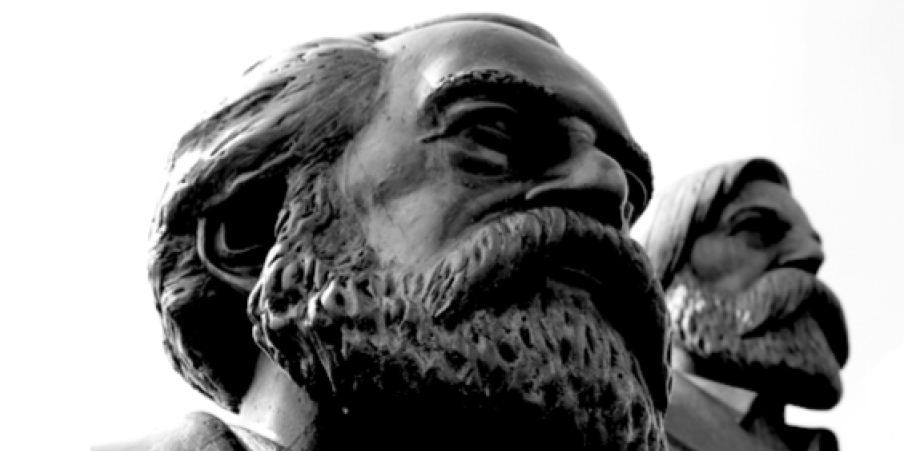The Legacy of Karl Marx
 Today is the 200th anniversary of the birth of Karl Marx. Parts of the liberal establishment are falling over themselves with excitement, marking the occasion with a wave of books, articles and events. My favourite gem is Radio 4’s scheduled drama based on Marx’s Das Kapital. Squashing Marx’s economic ponderousness into a sixty-minute play seems so unlikely that until I hear it for myself I won’t be convinced it’s not an elaborate leg-pull. But perhaps it’s foolish to be surprised by anything the BBC does.
Today is the 200th anniversary of the birth of Karl Marx. Parts of the liberal establishment are falling over themselves with excitement, marking the occasion with a wave of books, articles and events. My favourite gem is Radio 4’s scheduled drama based on Marx’s Das Kapital. Squashing Marx’s economic ponderousness into a sixty-minute play seems so unlikely that until I hear it for myself I won’t be convinced it’s not an elaborate leg-pull. But perhaps it’s foolish to be surprised by anything the BBC does.
The blurb for the show describes Das Kapital as ‘one of the few books that have changed the world’. I agree. Tens of millions of corpses, from the Cambodian killing fields to the slave camps of Siberia, are evidence for that claim even if it’s not quite what the BBC meant.
But is it fair to judge Marx himself by the homicidal regimes that acted in his name, long after his death? Marx never held political office and never killed anyone himself. He died decades before any Communist government was established. But his ideas provided cover and justification for some of humanity’s greatest crimes.
Marx thought that he had uncovered the great laws of history, comparing his ‘discoveries’ about how societies evolve to Darwin’s ideas on biological evolution. Marx insisted that all of politics, in fact virtually all of human behaviour, could be could be reduced to these laws. These were concerned of course with the economic relationships between classes. Imbalances in economic power were the source of all evil. Meaning that any political movement not obviously motivated by a ‘bourgeois’ desire to enhance its own economic status, and that claimed to seek economic justice for the oppressed, was on the side of virtue. In fact, on the side of history itself.
Marx refused to understand that some of the most evil people and political movements are motivated not by material wealth, but by a simple love of power or the hyper-inflated sense of superiority that comes with ideological certainty. His crass insistence on the primacy of economics in all circumstances gave cover to some of the most monstrous and murderous criminals in history.
Marx’s defenders would claim that Stalin or Pol Pot or any of the other Communist despots weren’t genuine Marxists, but chancers abusing Marx for their own ends. That’s no defence. Marx gave them their ideological framework and cloak to hide behind. And although Marx was long gone when the first Communist dictatorships were established, he had many contemporaries, including comrades from the earliest days of the proto-Communist movement, warning him that his ideas carried the seeds of terrible tyranny. He failed to listen.
Of course the system Marx wanted to replace had its own injustices, and unregulated monopoly capitalism can be rapacious. But I would rather live under Al Capone or a pirate chief than Enver Hoxha or Lenin. Better to be robbed blind than led to Utopia by a maniac.
Marx also failed as a prophet. His claims to have unravelled the laws of history and to ‘scientifically’ predict the course of human events were wrong on the grandest of scales. Particularly his claim that capitalism would lead to the catastrophic pauperisation of the ‘proletariat’. Even between his publication of the Communist manifesto in 1848 and his death in 1883, workers’ living standards were going up and up. Of course that process accelerated massively in the 20th century. Despite two world wars, capitalism did the exact opposite of Marx’s predictions. Yet many, including the BBC, would have us believe that Marx was a ‘genius of the modern age.’
But capitalism could only perform its miracle in countries not infected by the Marxist virus. Decades and decades of potential economic advancement were lost across huge areas of the world. From Mongolia to Cuba, blinkered ideologues armed with Marx’s cranky ideas stifled development and kept the poor, poor. Marx’s name should be cursed for that alone.
There are plenty of other idiocies or evils you can explore in Marx’s work. For example, there is its closed and circular logic by which anyone not accepting its wisdom can be diagnosed as suffering from false-consciousness or mental enslavement to bourgeois values. Marxism is the antithesis of open thought or genuine enquiry. Marx’s verbose and pompous output has closed the minds and clogged the intellects of generations of young people anxious to understand the world. As Communism’s great historian Robert Conquest has pointed out, as well as being a bad economist, Marx was a bad historian and a bad philosopher too.
Whatever the BBC or bien-pensant academics would have us believe, Karl Marx’s legacy is death, misery and poverty. His 200th birthday should be mourned, not celebrated.
Copyright © 2018 Ollie Wright The Conservative Woman-All rights reserved